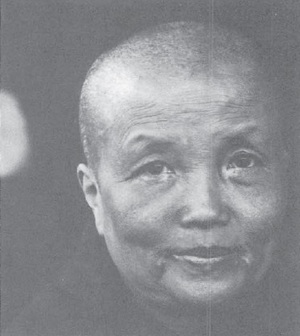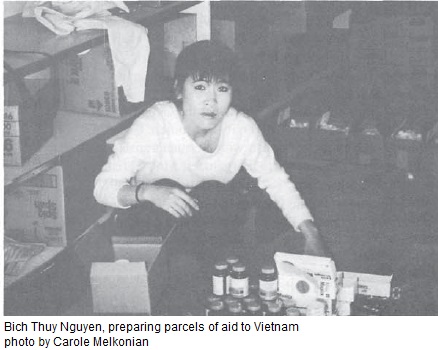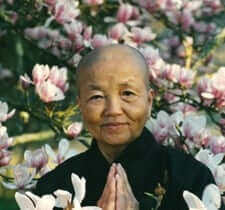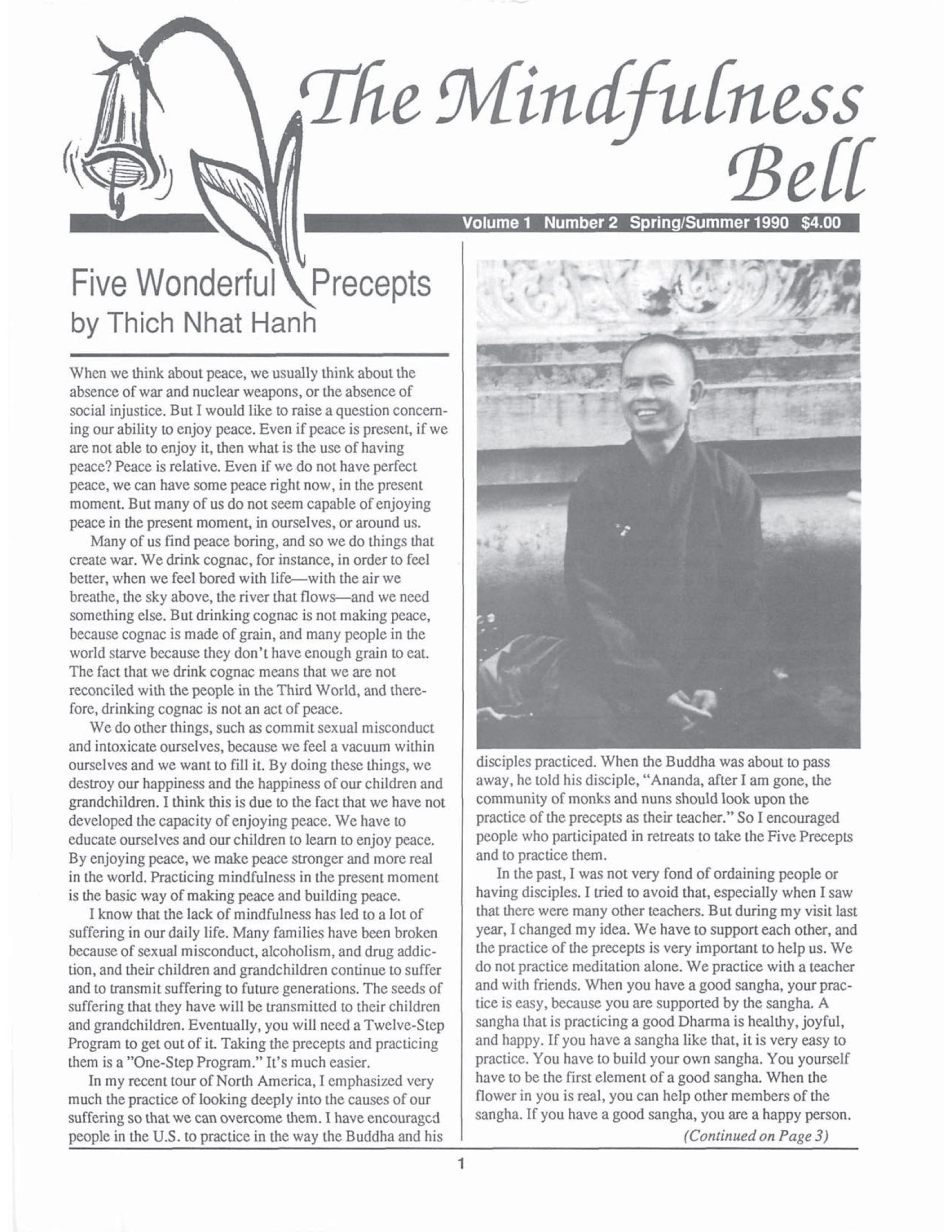By Sister Chan Khong in May 1990

I would like to report evidence of the criminal justice situation in Vietnam at the present time, because it seems very few people living outside Vietnam are aware. I myself lived as a Vietnamese citizen in Vietnam for thirty years–under French colonialism until 1954 and later in South Vietnam during the war between the Communists and the Nationalists, supported by the Soviet and American blocs.
By Sister Chan Khong in May 1990

I would like to report evidence of the criminal justice situation in Vietnam at the present time, because it seems very few people living outside Vietnam are aware. I myself lived as a Vietnamese citizen in Vietnam for thirty years--under French colonialism until 1954 and later in South Vietnam during the war between the Communists and the Nationalists, supported by the Soviet and American blocs. During that entire time, I never witnessed such human rights violations as have occurred and are occurring under the government of the Socialist Republic of Vietnam. Because there are so many abuses of human rights, I will only mention several of the most shocking.
Arbitrary Arrest & Detention Without Trial
Ordinary citizens are not allowed to stay overnight in any house if they are not officially registered as a member of the family living there. Because there are so many arrests under this law, there is never enough room for all the prisoners. So the arrested are moved from one jail to another, making it nearly impossible for the prisoners' families to keep track of their whereabouts. Some prisoners remain in jail for seven or eight years before their cases are even tried.
Citizens are not allowed to travel outside their own village without local police permission. People are frequently arrested on buses because they do not have proper permission.
A number of women arrested in 1984 and 1986 and held in Bo La re-education camp claim that huge numbers of women in this camp have been arbitrarily arrested and are being held without trial. Bo La re-education camp has a reputation for "elastic sentences," which means the sentences are prolonged year by year. Some women hear that they will soon be released, but then without any reason the promised release date is postponed over and over again.
I am acquainted with one of the detainees of this camp, a simple, humble, and completely honest woman named Nguyen Thi Nghia. She is vegetarian and would never kill a mosquito, yet she is being held on a charge of inciting and organizing armed resistance against the regime. She is the archetype of Vietnamese gentleness and kindness. It is through Nguyen Thi Nghia that I know about the arbitrary arrest of many other detainees in the camp. It is to escape being arbitrarily arrested like this that many people choose to flee from Vietnam. Everyone in Vietnam knows the new saying, "Even the lamp posts would flee if they could."
The authorities claim to many western diplomats and journalists that "there are no longer detainees in re-education camps, which have nearly all been closed. The few dozen prisoners who remain are criminals who have plotted to overthrow the regime." I have received letters from people who have visited the re-education camps who report that Camp Z 30A, in Dong Nai province, has over 1,000 detainees, among them the writer Doan Quoc Sy and the Buddhist scholar and monk Thich Tri Sieu. Z 30B has 2,000, and Z 30C, in Thuan Hai province, has more than 1,500, among them the monks Thich Due Nhuan, Thich Tam Can (Tran Viet Ding), Thich Chon Nguyen (Truong Tam Lac), and Thai Than Hung.
Visitors to Xuan Phuoc Camp, in Khanh Hoa, have not told me the total number of detainees, but have said there are large numbers of people sentenced to life imprisonment in that camp. Food is very scarce and prisoners die very quickly if they become ill as a result of undernourishment.
This is the reason why this camp is called ''The Valley of Death." One report says that since the transfer of the Buddhist scholar and monk Thich Tue Sy to this camp, the situation has improved a little bit, not because the authorities have done anything to improve food supplies, but because people in the district want to support this venerable monk and regularly bring him food and medicine which he is able to share with others.
Discrimination Against the Families of Those Who Worked for the Former French and American Regimes
In Education: To obtain a certificate of secondary education, the pass level varies according to who is taking the examination. For example, the son of a Party official needs only six points out of twenty to pass, the son of a "patriot" needs eight points, and the son of a government employee needs ten points. However the son of a nguy (literally means a "dissimulator" and refers to those who formerly worked for the French or American regime) needs eighteen points to pass. There is a new proverb in Vietnam: "Use your talent to study, but whether you pass or not depends on your family tree."
In Religion: In the Constitution of the Vietnamese Socialist Republic there is a clause which few people notice: "Everyone is free to choose and practice his own religion, but is also free to choose not to have and practice any religion." What in fact happens is that on religious festivals such as Christmas or Buddha's birthday, the party officials set important examinations for students and designate assignments to employees. In effect, this means that anyone who chooses to practice religion is punished by not being able to sit and pass the examination, or by losing their job by not fulfilling the designated assignment.
At Work: When applying for a job, applicants must submit not only their own curriculum vitae, but also those of their immediate relatives and of the three previous generations. These curricula vitae weigh much more than the talent of the applicant. When a scientist publishes his research, he has to give his paper to an ignorant Party official whose signature will appear as its co-author. Scientists with a sense of integrity are unable to do this.
Punishment of Repatriated Boat People
Even if the government organizes a huge welcoming party for the boat people who "choose voluntarily to return to Vietnam," we cannot be sure that they will not later be sent to a re-education camp when foreign journalists have turned their attention elsewhere. Everyone in Vietnam knows that prisons in many Mekong delta provinces such as Ben Tre, Tra Vinh Can Tho, Bae Lieu My Tho, hold only boat people who failed in their attempt to escape. A letter I received from Nha Trang (Phu Khanh) in response to my question whether boat people who returned voluntarily to Vietnam would be punished, told me that during the second half of 1989 the Marine Police of Vietnam had caught four boats in the Phu Khanh area, which were trying to flee from Vietnam. All of the passengers on board these boats are still being held in a re-education camp near Xuan Phuoc; this is a new camp which lies near the large A20 camp. Even the women and children still have not yet been released.
It has been reported to me that the marine police in Hong Kong often push back boatloads of refugees, telling them they will be considered illegal immigrants, not refugees, until the lengthy screening process is complete, and they will be held in a detention center for many months, maybe even years. If eventually they do not receive refugee status, they have to suffer the consequence of forced repatriation. Following such warnings, many boats leave Hong Kong, and because they are not equipped or seaworthy, they sink and many people are drowned. I understand how difficult it is for the Hong Kong authorities to find suitable facilities for so many people, but I also know that many magnanimous, philanthropic people in Hong Kong want to help, and the government will not allow them to do so.

There follow a number of points at which I would like the Hong Kong authorities to look deeply, so that the very unsatisfactory situation of the present time can be improved.
1) The number of officers involved in carrying out the screening process should be increased. This could be done by calling in the help of voluntary humanitarian organizations who have Vietnamese people on their staff. Vietnamese people know the subtleties of their language and are in a much better position to help assess refugee status than the Chinese people currently employed. Many of these translators are very incompetent in the Vietnamese language and the interviewers in the screening process are overworked. Thousands of asylum seekers are victims of these shortcomings in the application process, and genuine political refugees risk being sent back to Vietnam where they will be imprisoned for many years. A well-trained body of interpreters and interviewers for the screening process is needed.
2) The Correctional Service Department Officers, who have been trained to deal with criminals, should always bear in mind that refugees or asylum seekers who as yet have been accorded no status, are not criminals. Brutalities have been reported by many refugees (the evidence can be found in Amnesty International's recent report, Vietnam: Renovation Doi Moi, the Law and Human Rights in the 1980s.). They are human beings who want to live with dignity and there is every reason to believe they are honest. A great number of them are intellectuals and could contribute much to humanity if they are allowed to serve mankind in freedom and dignity. They should not be beaten as criminals. Their human dignity has been crushed by a totalitarian regime, and they need help to restore this dignity.


